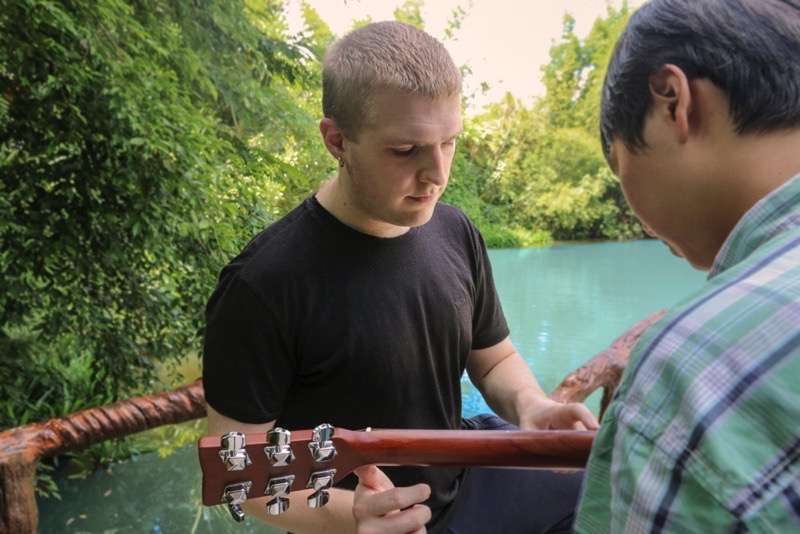Choosing A Guitar Teacher

The author teaches a lesson by a lake in Northern Thailand.
Do You Need a Guitar Teacher?
Most people who decide to learn the guitar would benefit a great deal from having a teacher.
A good teacher can:
- Direct your attention to the work you need to be doing most
- Help you to avoid forming bad habits—from the beginning
- Place you along a smooth path of learning, helping you to steer clear of big roadblocks and frustrations that often prompt people to quit
- Keep you motivated and hold you accountable for achieving your practice goals
What About All Of Those Self-Taught Musicians?
Many musicians are entirely (or mostly) self-taught. Some learn quickly, and can teach themselves, with sufficient time and dedication. The only use for a teacher, then, is to help these learners save time and increase their motivation. Other guitar learners must struggle to learn to play, and for this group a teacher is especially valuable.
The truth is, learners of all types will benefit by spending time with an experienced teacher. There are very few credible musicians who would repudiate that point.
How to Find a Great Teacher
Qualifications and Experience
The first thing to consider when choosing a teacher is their qualifications and experience. Positive qualifications include:
- Experience teaching music
- A bachelor’s degree or higher in music
- Professional experience in performing or recording music
- Recorded music available for listening
In most cities, it’s not hard to find someone who meets all of these requirements.
Attitude Matters
While there are many people who are very good at playing the guitar, only a few are good at teaching. Unfortunately, it is very difficult to make a living in the arts. As a result, there are many people teaching music who do not really want to. Many people think that teaching music is just a way to “pay the bills”. If you end up under the care of such a teacher, you may not notice at first. However, you may eventually notice that there is a lack of genuine interest in teaching you how to play the guitar. Most people do not love their jobs all of the time, and teachers are no exception; however, it is not too much to ask that your teacher is committed to professionalism. If they aren’t, the only solution is to find a teacher who views teaching you as a job and not an inconvenience.
Popularity Counts
Good teachers are normally busy. The typical fly-by-night teacher cannot assemble a loyal student base quickly. Establishing a teaching practice takes years of patience.
Don’t Worry About Style
Prospective guitar students sometimes place too much importance on the teacher’s preferred musical styles. Except for very advanced players, it is not necessary to look for a teacher on the basis of the styles you want to learn. Even if you are very keenly interested in one particular style, any teacher who is proficient at guitar can help you learn what you will need to play that style. If you are a complete beginner, you should not expect to put much attention into specific guitar styles at least for the first 6 to 12 months of playing. This is because you will need to learn many fundamentals of the guitar first. And even after that time, general musicianship is more important than style.
Signs of a Great Teacher
Great teachers show enthusiasm for the progress of their students, give their students specific feedback, assign exercises to improve areas needing development, and attempt to create continuity from one lesson to the next. Good teachers strive to help their students reach new levels of playing ability. Finally, a good teacher is one who is proud to teach. If you have a teacher who cannot tell you anything about their teaching methods, this is a sign that they have not put any thought into it.
Policies
A good teacher likely has policies in place to protect their professional integrity and to share responsibility with students. Be prepared to accept that studying with a credible teacher means agreeing to specific terms of payments, missed lessons, and makeup lessons—and being held to them. The mere fact that lessons are one-to-one leads some students to assume that there is a degree of flexibility with scheduling and payment. However, nothing could be further from the truth. Makeup lesson requests can be unfairly burdensome. A teacher who gives 60 lessons per week cannot allow all students to cancel and then teach 120 lessons the following week. For the busy teacher, it just doesn’t work that way.
Personality Match
It’s worth considering the personality fit. All other things aside, it is generally best to work with a teacher with whom you get along well, and who you feel inspires you to reach a new level of guitar playing ability.
Where to Look For A Teacher
Asking people “in the know” is a must. If you know any music educators, ask for leads.
Do not assume that the teacher you’re looking for will be at a music learning center orin the back of some store waiting for you.
Look for teachers who are active and highly rated on Yelp, ThumbTack and Google. If you’re lucky, and willing to travel a bit you’ll likely find a great teacher in any major metropolitan area.
Coda
If you’re serious about learning the guitar, one of the best things you can do is go out and find yourself a good teacher.
 As the creator of Hub Guitar, Grey has compiled hundreds of guitar lessons, written several books, and filmed hundreds of video lessons. He teaches private lessons in his Boston studio, as well as via video chat through TakeLessons.
As the creator of Hub Guitar, Grey has compiled hundreds of guitar lessons, written several books, and filmed hundreds of video lessons. He teaches private lessons in his Boston studio, as well as via video chat through TakeLessons.